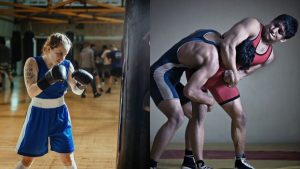When one envisions wrestling, images of muscular athletes locked in fierce combat may come to mind. While physical prowess is undeniably vital, the often overlooked component in this intense sport is mental toughness. Just as muscles give athletes the strength to overpower opponents, psychological resilience provides the edge to outwit and outlast them.
Understanding Mental Toughness in Wrestling
Mental toughness is the psychological edge that allows individuals to cope better than their opponents with the demands, pressures, and stressors of competition. In wrestling, where matches can be won or lost in split-second decisions, a strong mind can be as crucial as a strong body.
The Components of Mental Toughness
- Self-Belief: Confidence in one’s skills is paramount. Wrestlers with self-belief remain unfazed by the reputation or physical stature of their opponents.
- Motivation: A relentless drive to succeed, to improve, and to overcome setbacks, is the fuel that propels wrestlers to persevere in tough matches.
- Focus: The ability to concentrate on the task at hand, blocking out distractions—be it a roaring crowd or personal issues—is crucial.
- Composure: Staying calm under pressure, especially when on the back foot, allows wrestlers to think clearly and make strategic moves.
How Mental Toughness Translates to Wins
- Strategic Play: A mentally tough wrestler can assess an opponent’s strategy mid-match and adapt swiftly.
- Overcoming Adversity: Be it an injury, a point deficit, or a challenging opponent, mental resilience allows wrestlers to push through barriers.
- Stamina: Beyond physical stamina, wrestlers need mental endurance to remain sharp and responsive, especially in lengthy bouts.
Cultivating Mental Toughness
Building psychological resilience isn’t an overnight task. It requires consistent effort, akin to physical training. Some methods include:
- Visualization: Imagining scenarios, strategies, and positive outcomes can boost confidence and preparedness.
- Mindfulness and Meditation: Techniques that promote focus and reduce anxiety can enhance in-match concentration.
- Positive Self-talk: Reinforcing beliefs in one’s skills and abilities helps maintain confidence.
- Exposure to Pressure Situations: Regularly placing oneself in challenging scenarios, in training or smaller competitions, can build resilience over time.
Conclusion
In wrestling, while muscles, agility, and technique are undeniably essential, mental toughness provides an edge that can be the difference between victory and defeat. By recognizing its importance and actively cultivating it, wrestlers can ensure they step onto the mat with both physical and psychological advantages.


